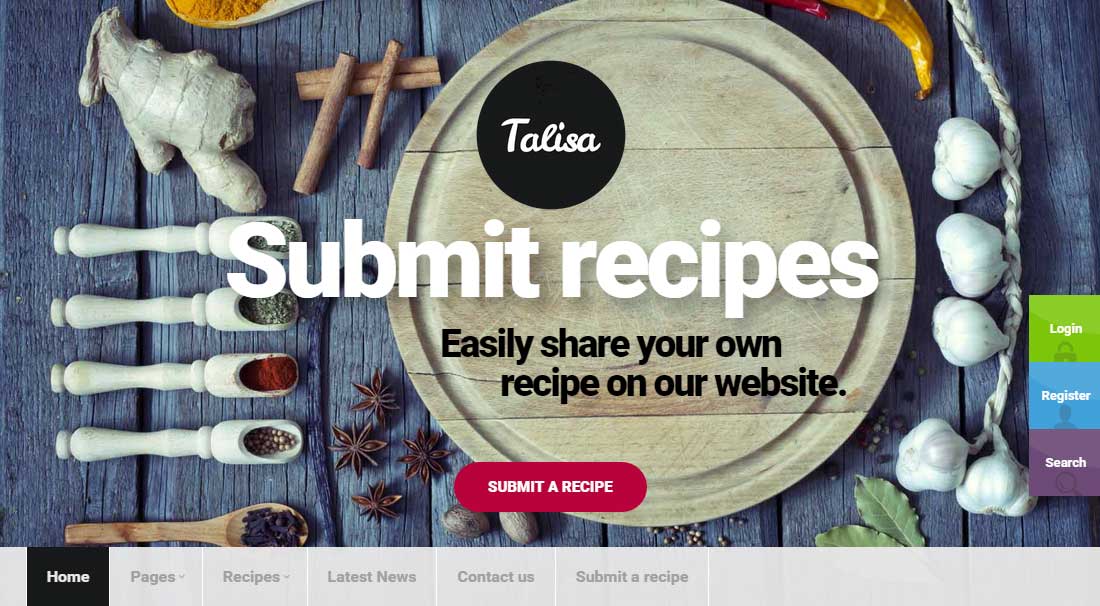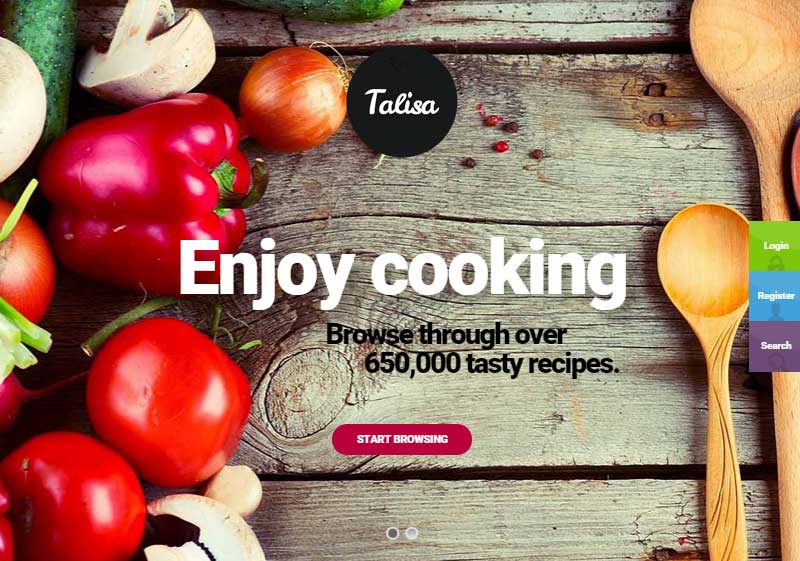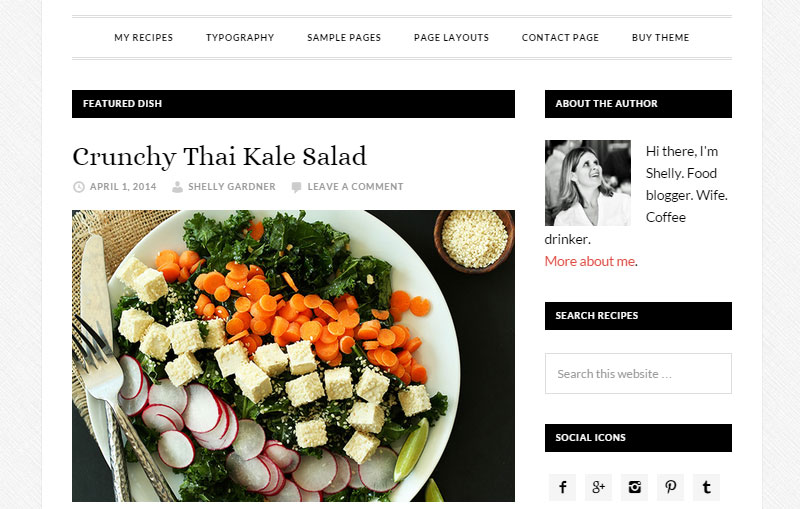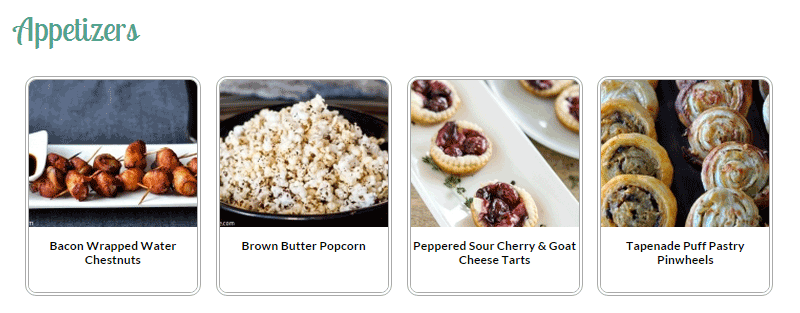
How to Start a Food Blog Today with WordPress
[ad_1]
Do you have a succulently delicious recipe that you’d like to share with the world? Or perhaps, maybe you’d like to become a better cook and want to chronicle your journey online; either way, building a website to share your culinary creativity with the global audience has never been easier than it is now with WordPress. However, for first-time WordPress users, you might want to follow this guide on how to start a food blog.
WordPress is an incredibly diverse tool for building almost any type of website and food blogs are no exception. Equipped with a suitable theme and plugins, anybody with the right mindset (and a little bit of patience) can join the world of food blogging.
If you’re a technophobe and think developing a website requires a degree in geek then you will be relieved to know that WordPress offers a fully graphical interface so you won’t have to touch a single line of code (but you can if you want to). Add to this an ecosystem full of purpose-built templates and plugins designed specifically for food enthusiasts such as yourself, and you will find that designing and developing your dream food blog is actually quite easy.
Looking to make money out of your food blog or thinking of long-term financial benefits? If you do it well, and I mean really well, then yes it is possible. Don’t forget, though, that there are thousands of other food bloggers out there who are also thinking the same thing. However, if you are willing to dedicate the time to writing, maintaining and building it, there’s always a good chance that you will be able to carve out your own niche as a professional food blogger.
So, to help you get started on your dream of creating a popular and well-read food blog, here are 10 themes and plugins that will transform your humble WordPress site into a ready-to-go food blog.
Top Five WordPress Food Blogging Themes
We’ll begin with templates, or themes as they are known in the WordPress world, as this will dictate how your food blog will look, and to some extent function.
Themes are pre-built packages that allow you to quickly and beautifully overhaul the appearance of your site to match your vision.
When it comes to creating a successful food blog image is everything and being able to showcase high-quality photos of your kitchen creations is key. Therefore finding a theme that makes it easy to display your photographs in the best possible way should be a priority.
Other features you might want to look out for include the ability to publish nicely formatted recipes – although there are plugins that can take care of this if your theme doesn’t, a mobile-friendly layout, and an overall aesthetic that will appeal to your target audience.
To simplify this process, here is a shortlist of five suitable food blogging themes, from the countless options available today.

This theme has been perfectly optimized for creating a food blog with WordPress. As your visitors browse down through the recipes, they should hopefully become fully engaged with, and inspired by your content.
While your photos will help draw in your visitors, the attractive and eye-catching design of the Talisa food blog theme will keep them coming back for more. One nice feature of this theme is that it gives you the ability to allow your visitors to submit their own recipes. This can be a great way to build your community and add some essential interactivity to your website. Your visitors can also ‘favorite’ recipes that catch their eye, for future reference upon their return.
Talisa has a powerful design and appearance, combined with lots of little features that will help to build a following of loyal readers.

Divi isn’t specifically a food blogging theme, but it’s worth mentioning here thanks to how flexible it is.
Whatever type of website you are trying to build, Divi and its intuitive page builder tool can help you achieve your goals. One benefit of using this theme over a dedicated food blog theme is that you can really design your own custom website to ensure it won’t look like any other recipe website already out there. If originality and a good level of control over how your website looks are important to you, then Divi is well worth checking out.
Divi is available as part of a package of other themes and truly useful plugins for one low price, making it a great value option.

If simplicity is more important to you than a wealth of features and all the latest bells and whistles, then the Daily Dish theme will appeal.
To help you build the website you want, this theme comes with six-page layouts and a landing page template to choose from when publishing your food blog content. The whole design is also fully mobile responsive and the clean code will ensure your site loads as quickly as possible.
You shouldn’t have any trouble setting up your website with Daily Dish, and if you do need to add more features to your site further down the line, there’s a whole world of suitable plugins just a few clicks away.
Top WordPress Plugins for Creating a Food Blog
Once you’ve chosen a theme, it’s time to look at the additional features you will need to add to your WordPress website in order to build a truly useful food blog. These features are added to your site via one or more of the many plugins available for WordPress.
While some of these plugins are food blog-related, others are simply those that will add some essential features that no WordPress blog should be without.
There are many very well-designed plugins just for the purposes of making a food blogger’s life easier and so much more fun. Some of these plugins will add a professional and consistent “recipe card” to your websites, this allows users to easily download and print the recipe and keep a piece of your website with them. It’s little details like this that make users want to come back to your site for a second time, then maybe even a third time.
Furthermore, Google has recently started identifying appropriately structured recipes in their search engine results. This means that this type of content will now stand out in the search results and hopefully drive more visitors to your site. If you want to take advantage of this feature, be sure to look for an appropriate plugin.

This particular plugin is important for food blogging sites specifically because it helps optimize your recipes for search engines. This means Google will be able to identify your content as a recipe and list it in their results accordingly. The result is that your content will stand out in the search engines and send more traffic to your food blog.
Other features of the Recipe Card plugin include the ability to display nutritional data about your recipes, as well as giving your readers the option of easily printing and saving your dishes.
The free Recipe Card plugin not only makes it easier and faster for you to add recipes to your blog, but it also makes them easier to follow for your visitors.

The BigOven Recipe SEO plugin is another option for optimizing your recipes posts for search engines.
This free plugin can also be used to import your saved recipes from the now-defunct Ziplist recipe repository. Other features include an easy-to-use print button for your recipes and three different templates to choose from for formatting your content.
This is a newly released food blog plugin for WordPress, but it’s one that adds a few useful features to your website for free.

Slimmer is another recipe publishing tool for WordPress. This plugin adds a new custom post type to your website, complete with a form for adding recipe-specific content. This includes ingredients, cooking instructions, and other information about the dish being discussed.
By using this plugin, the recipes on your blog will have a more straightforward and uniform appearance, helping to make them more easily digestible by your readers.

As the name suggests, this free plugin creates a visual index of all your recipe content, making it easy for your visitors to browse all the recipes you’ve published on your blog, all in one central location. The index can be divided into groups, with the plugin simplifying the process of adding and managing the thumbnail images for each recipe.
Visual Recipe Index adds a useful feature to your website that will help your visitors find more of your great content.
Other WordPress Plugins to Consider
While the following plugins aren’t food blog-specific, they can and will help grow your blog and make it a success. So, here is a quick run-down of some essential blog plugins to consider:
- Optin Forms: add email signup forms to your site for free
- Bloom: display premium pop-up forms to grow your email newsletter
- NextScripts Social Networks Auto-Poster: share your blog posts socially
- WP Smush: optimize your photos for fast loading pages
Also, don’t forget to check out this collection of essential free WordPress plugins for websites of all types.
Conclusion
Starting a food blog is a fun project, and who knows where it might lead? From growing a huge following, earning money from advertising, or launching your own cookery book, there really is no limit to where your humble food blog can take you.
Thanks to WordPress and its vast library of themes and plugins, starting your own blog has never been easier of more affordable. So what are you waiting for?
Which food bloggers do you follow? What’s stopping you from starting your own food blog? Please share your thoughts in the comments.
Disclosure: This page contains external affiliate links that may result in us receiving a commission if you choose to purchase mentioned product. The opinions on this page are our own and we don’t receive additional bonus for positive reviews.
[ad_2]
Source link









